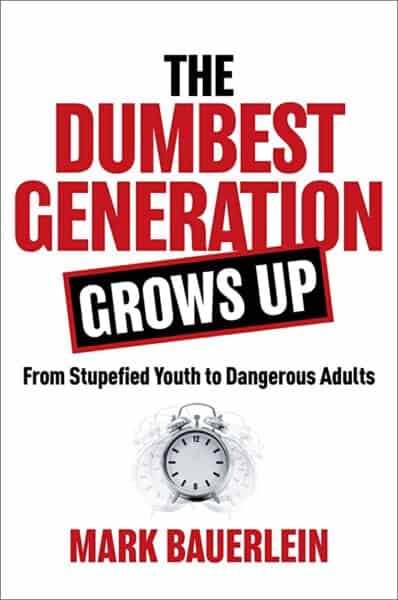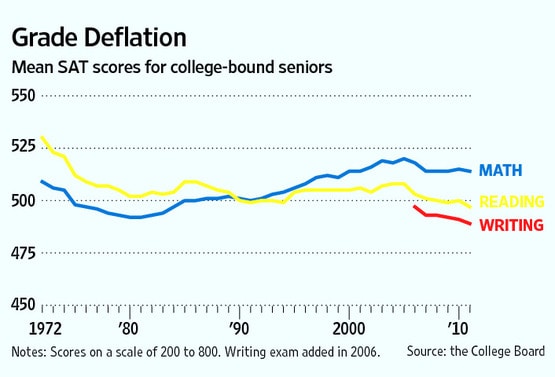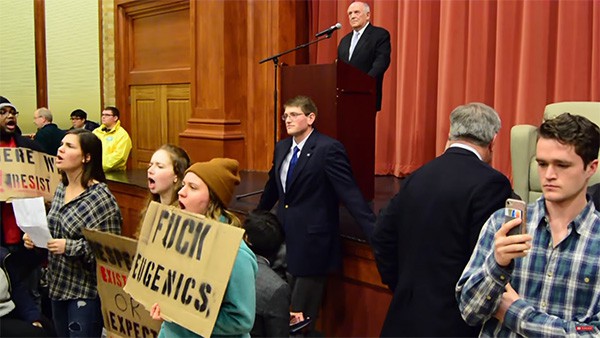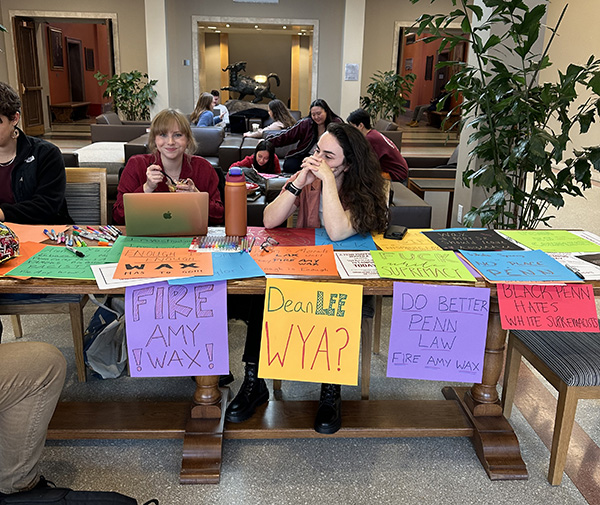
Mark Bauerlein, The Dumbest Generation Grows Up: From Stupefied Youth to Dangerous Adults, Regnery Gateway, 310 pp., $19.79.
The Dumbest Generation Grows Up is Mark Bauerlein’s sequel to his bestselling 2009 book, The Dumbest Generation: How the Digital Age Stupefies Young Americans and Jeopardizes Our Future. Both books deal with Millennials, the generation usually defined as anyone born between 1981 and the mid-90s, and the author, who taught English at Emory University for many years, has had a good look at this generation. His first book was widely reviewed, with many critics commenting on its “dire predictions” for the future of Millennials. As its title implies, Prof. Bauerlein’s new book explores whether these predictions have been borne out. He argues that they have.
The conclusions of the earlier book can be summarized in a single quotation: “The Dumbest Generation will cease being dumb only when it regards adolescence as an inferior realm of petty strivings and adulthood as a realm of civic, historical, and cultural awareness that puts them in touch with perennial ideas and struggles.”
The conclusion of Prof. Bauerlein’s new book is that the dumbest generation has most certainly not grown up. But the volume is far from being one long “I told you so.” Prof. Bauerlein offers us fresh reflections on what has gone wrong with Millennials and how we might avoid making the same mistakes with future generations.
Needless to say, “what’s wrong with kids today?” is a perennial lament, and Prof. Bauerlein mentions that many have dismissed his concerns for precisely this reason. Especially among older generations, there is a strong desire to believe that our problems are nothing fundamentally new, that the doomsayers are taking it all far too seriously, and that everything will sort itself out. I saw this attitude in my own parents.
Admittedly, “we are doomed” is a bitter pill to swallow. But it is hard to come away from any sustained experience with Millennials without becoming a doomsayer.
Like Prof. Bauerlein, I recently retired from many years of university teaching, a good portion of which was spent trying to understand the problems of my students, who changed dramatically over the course of my 30-year career. Toward the end, I was teaching “Gen Z,” the generation after the Millennials — who, if anything, are worse.
My students combined ignorance with strident moral certainty (possibly the most striking thing about high-profile Millennials like Alexandria Ocasio-Cortez). They seemed to have had no general education at all, and lacked the most basic knowledge of history, even recent history. They were immature and emotionally fragile.
Many could not handle criticism, no matter how sugar coated. It took very little to reduce them to tears — or to send them into fits of narcissistic rage. They were shockingly bereft of intellectual curiosity, and many gave the impression of having no internal life at all.
It was difficult to get a class discussion going, because my students were often unwilling to make judgments of any kind. Partly, this was because they had an intense fear of offending anyone. But, in addition, they professed to believe that everything is “relative” and that it’s therefore wrong to judge (completely unaware of the fact that this itself is a judgment). They also saw no inconsistency in espousing relativism and then, in the next moment, denouncing their political opponents as “evil.”
In general, their moral reasoning was framed exactly in these sorts of black and white terms (an issue that is very important for Prof. Bauerlein, as we shall see). But in their own behavior they were often shockingly amoral. Many lied to me, and I caught large numbers of them cheating on assignments. They were always looking for shortcuts. Almost none did the assigned reading.
Many could not follow a simple chain of reasoning. Often it seemed that my class was the first occasion they had ever been challenged to think. It was common for them to visit me during my office hours and ask me to tell them exactly what I wanted them to say on tests or in papers. When I said that I wanted to see evidence that they had done their own thinking, they would look panic stricken.
A very sizeable percentage of students had a documented “learning disability” that I was required somehow to work around. Many of them had been diagnosed as somewhere on the autism spectrum. They often seemed disconnected from their bodies and from nature. In my last several years of teaching, more and more identified as transgender.
Most of my students seemed desperately unhappy and unfulfilled. I became convinced, and still am, that something had gone seriously wrong with these people. Yes, it’s true that the older generation has always complained about the younger, probably since human life began. But the Millennials and Gen Z seem to have problems that are unique — and uniquely bad. Bad for them, and bad for society’s future. If these are the people who will be in charge one day, it really is hard not to believe we are doomed.
Searching for some precedent, we might be tempted to liken our “woke” Millennials and Gen Z to the starry-eyed students radicals of the 1960s. But the similarities are only superficial. As Prof. Bauerlein points out, the children of the ’60s were protesting the Vietnam War and the draft — major issues, in other words. Students today are protesting “microaggressions.”
And the radical youths of the 60s were far more literate than what passes for young radicals today. In the ’60s, when Robert Frost visited a university to read his poems, he would fill a stadium. Today, the students would attend only if required, and they would sit in the bleachers texting through the entire event.
Certainly, the youth of today are overwhelmingly liberal, just like their predecessors in the 60s. But this seems to be perennially true. As Winston Churchill supposedly said, “If you are not a liberal when you are young, you have no heart, and if you are not a conservative when old, you have no brain.” What is genuinely surprising, however, are the polls showing that more than a third of Millennials support communism.
One reason for this, of course, is ignorance of history. Most Millennials can give you an exact figure of how many people were murdered by the Nazis, but they have no idea that in the last century communist governments killed around 100 million of their own citizens. The other part of the problem, however, is that even the Millennials who support communism don’t even really know what it is.
When I confronted my leftie students with the figure of 100 million dead, they would usually respond, “But that wasn’t real communism!” It was a line some had picked up from professors. Each time someone said this in class, I asked the students to explain to me what “real communism” is. None could.
This is why Prof. Bauerlein is critical of conservatives who call these young people “socialists.” They don’t know enough to identify as socialists, or anything else. He points out that while his students have pledged to fight racism, most are unaware of the steps already taken by the courts and the legislature to end discrimination.
A friend of mine got a vivid sense of this when he decided to attend a BLM protest two and a half years ago in Atlanta, passing himself off as a fellow traveler. The young white protestors he spoke with said they were there because “nothing had been done” for blacks. When my friend gingerly asked them how they assessed such measures as affirmative action, most had no idea what he was talking about.
How can you join in the “ongoing struggle” when you have no knowledge of the ground that’s already been won? It’s for reasons such as these that Prof. Bauerlein prefers to call the younger generation “utopians” rather than committed socialists. As he puts it:
What belief best suits a youth who doesn’t want to go to church? What conception of human nature will appeal most to someone who trusts in his own exceptional nature? What vision of the future works best for someone with no sense of the past? What standard of judgment goes with a sensibility that won’t distinguish superior from inferior creations? What ultimate meaning will he find on his own? The answer is: Utopia.
The Utopia today’s youth yearn for is one where everything will be “fair” and everyone will be “nice.” No one will want for anything, and no one will have to do anything he doesn’t want to do. Work (if there is any) will be “fun.” All the pseudo-problems (“systemic racism,” “climate change,” etc.) will, of course, have been solved. And, most importantly, all student loan debt will have been forgiven.
It is hard to believe that their views are this simplistic, but they are. I had to sympathize with Prof. Bauerlein’s descriptions of how he struggled mightily to find some depth in his students’ worldview. He recalls asking one young woman why students were so “triggered” by an impending campus visit by conservative pundit Milo Yiannopoulos. Drawing her words out for effect, she responded, “They believe that everyone . . . deserves . . . to be happy.” And she chose not to elaborate.
The problem with Milo is that he is sharp-tongued; his words hurt. That some of those words are true is simply not a relevant consideration. The Utopia of the Millennials and Gen Z will be one where no one’s feelings will be hurt, and thus no one will be made unhappy. Being thin-skinned and easily offended are the characteristics of the younger generation that are now most often noticed. Their views on freedom of speech are exactly what you would expect them to be.
Prof. Bauerlein cites a recent poll showing that 44 percent of students think that the First Amendment does not protect so-called “hate speech.” Sixteen percent said that they “don’t know,” making the solidly pro-free speech contingent a mere 40 percent. Fifty-one percent believe that protestors are justified in shouting down a speaker uttering “offensive and hurtful statements.” Nineteen percent believe it is justified to use violence against such a speaker.
While liberal journalists and academics had hailed Millennials some years ago as the most “tolerant” generation in history, they have shown themselves to be anything but. Prof. Bauerlein cites the authors of a survey from 2020 called the “American Worldview Inventory,” who drew the following conclusions: “Findings show Millennials — by their own admission — as far less tolerant than other generations. In addition, they are more likely to want to exact revenge when wronged, are less likely to keep a promise, and overall have less respect for others and for human life in general.”
So, where did it all go wrong? Or, to quote the very first sentence of the book, “What have we done to them?” Prof. Bauerlein asks us to look to the reading habits of Millennials. The 2010 American Times Use Survey (ATUS) showed them spending fully five hours and 40 minutes per day on “leisure and sports.” Most of this, however, was screentime.
Reading print (books, magazines, etc.) accounted for a mere seven minutes on weekdays and six minutes on weekends. A 2006 survey of high school students found that 43 percent reported spending “one hour or less” reading for classes each week. Twelve percent reported “zero” reading for class. Contrast this to the Gen Xers of 1987, 47 percent of whom spent at least six hours per week preparing for class.
Again and again, Prof. Bauerlein demonstrates a steady and disturbingly swift decline over the past 30 to 40 years. College readiness scores in reading dropped from 53 percent in 2009, to 45 percent just 10 years later. SAT reading scores show a similar decline. A 2004 survey showed that only 43 percent of 18-to-24-year-olds read any kind of serious literature in the preceding 12 months. In 1992 it was 53.3 percent. In 1982 it was 59.8 percent.
There are several reasons why it is possible for students to get away with not reading literature. The first is that teachers have lowered their standards. In response to their students’ resistance to reading, teachers have simply required less.
Racial diversity is, of course, another factor in this decline in standards. The average black student is at nowhere near the reading level of even the worst whites. Since our educational system, and our society as a whole, cannot admit the reality of racial differences, areas of study where the disparities are all too obvious must either be eliminated or relentlessly dumbed down. The result is that generations of promising white students have been deprived of an education in good literature, so as not to draw attention to black shortcomings. Unsurprisingly, Prof. Bauerlein is silent on this subject.
The decline of reading standards in our high schools has had a catastrophic impact on university education. Early in my teaching career I realized that when I gave lectures, I could not assume that the students had read the assignments. It was useless to impose such measures as reading quizzes, since there would have been rampant failure. My students had not been challenged to read difficult material in high school. As a result, most of them could not understand the reading on their own, even if they tried to plow through every page.
Finally, there is a pervasive relativism in academia today. It began in the universities and has now taken root in high school. Many academics refuse even to entertain the idea that there are essential pieces of literature that all students should read, especially when books by Dead White Males top the list. Those who do believe in the importance of the “Great Books” tend to keep silent, for fear of being branded as right-wing. It is impossible to overstate the cowardliness and conformism of university professors.
Prof. Bauerlein blames Millennials’ lack of exposure to good literature for most of their problems. This is his central thesis. The idea was suggested to him by a colleague, who was commiserating with Prof. Bauerlein one day about his students’ shortcomings. “They haven’t read enough literature,” the man said, matter-of-factly. Prof. Bauerlein was astonished by the simplicity of this explanation — and by the end of The Dumbest Generation Grows Up he wholly endorses it.
For Prof. Bauerlein, not reading good books explains why Millennials hold such simplistic and naïve views, why they are unable to make nuanced moral judgments, and why they lack empathy for people who hold differing opinions. The same colleague explained to him that “a good novel is good psychology.” Prof. Bauerlein writes:
He didn’t mean anything complicated by that remark, only that good novels land interesting characters in situations of conflict, and good authors give them psychological depth. The characters have motives, and you have to figure them out. Read the books, and you treat the characters as real people having actual thoughts and doing real things. I immediately agreed. His point was too commonsensical to dispute.
In other words, you learn a lot about life and other people from reading good literature. It helps you become a more astute observer of the human condition, teaches you to empathize with others, sometimes even with the villain of the piece, and this fosters intellectual and emotional maturity.
Prof. Bauerlein cites neuropsychological studies showing that fiction activates regions of the reader’s brain aligned with what the characters are doing or feeling. In other words, you literally do feel something of Priam’s grief for Hector. I don’t think we needed neuroscientists to tell us this, but it’s the sort of evidence that tends to impress modern people, especially Americans.
Thus, the reason Social Justice Warriors tried to assault Charles Murray back in 2017 was because they hadn’t read enough novels. I am not caricaturing Prof. Bauerlein; this is what he claims. He writes that the students “didn’t see [Murray] as an individual, a man with a history and an experience. No, they faced a racist, a depersonalized, undifferentiated embodiment of racism, a figure distinguished only by his fame and power.” For students immersed in real literature, this would not have been possible.
While I myself have long preached the benefits of an education in the Great Books, I am not convinced that this is really the key to “what’s wrong with kids today.” The folks I spent time with a few summers ago in rural West Virginia haven’t read any literature either — yet they possessed the one priceless trait that seems to be lacking in so many Millennials: simple human decency.
The reason they possessed it was because they had led real lives — lives that were sometimes difficult. They had to grow up fast. There was no coddling; the tough-minded people who raised them had no patience with whining and excuses. They had to do without a great deal that other modern children take for granted. And, most importantly, their lives required them to spend most of their time in the real world interacting directly with other human beings and learning how to get along with them.
Millennials, by contrast, have spent much of their lives staring at screens, interacting with virtual friends who can always be kept at a distance. They have imbibed toxic quantities of propaganda and advertising, all of it presenting a sometimes radically false view of life and human nature. The people I met in West Virginia have seen too much real life to find “wokeness” plausible.
“They haven’t read enough literature” is much too facile an explanation of what is wrong with Millennials. But it’s exactly the sort of theory that one would expect of an emeritus professor of English — a man who has spent decades on college campuses reading books. That’s a nobler way of life than spending one’s days looking at TikTok, but it is just as removed from the real world.
Near the beginning of The Dumbest Generation Grows Up, Prof. Bauerlein offers us a few tidbits that could form an alternative (or complementary) explanation of what is wrong with Millennials. He mentions these, but then drops them — perhaps because they are just too depressing. For example, he quotes a New York Times article according to which parents working for the tech industry “increasingly panic over the impact screens have on their children and [are moving] toward screen-free lifestyles.” The reporter goes on to note that executives in Silicon Valley are now sending their children to “vigilantly low tech” schools, such as Waldorf schools.
In other words, they are worried about their own products damaging the developing brains of their children. Prof. Bauerlein also quotes Chris Anderson, former editor of Wired and head of a robotics firm: “We thought we could control it. And this is beyond our power to control. This is going straight to the pleasure centers of the developing brain. This is beyond our capacity as regular parents to understand.”
Anderson goes on to compare tech to crack cocaine, and Prof. Bauerlein responds with a line from the occasionally sagacious Bill Maher: “The tycoons of social media have to stop pretending that they are friendly nerd-gods building a better world and admit they’re just tobacco farmers in T-shirts selling an addictive product to children.”
It’s not clear that the damage screentime is doing to young minds is reversible. Some of my own students, despite my best efforts, seemed to be broken. Let’s hope it is reversible, for technology now seems to be breeding generations of people programmed to be shallow, unfeeling, tyrannical narcissists. The internet has been an enormous gift, especially to those of us on the Dissident Right. But as Paracelsus said, “All things are poison, and nothing is without poison; the dosage alone makes it so a thing is not a poison.”
It is dangerous to try to attribute a complex phenomenon to one single cause or condition. Prof. Mark Bauerlein is certainly correct when he argues that Millennials would have benefitted by greater exposure to good books. I am afraid, however, that the real roots of their problems may be much more sinister and much harder to fix.

 RSS
RSS

















“Microagressions” were invented because white racism no longer exists and blacks had to have an issue to blame their failings on.
The real problem is jewbrain.
Young people have been indoctrinated and they now think like jews….which means they are self hating idiotic anti-white lunatics.
Super article!
But the problem isn’t just the lack of reading the “Good Books’, it is the lack of reading in general, including newspapers and magazines. It is that their parents put them on a pedestal and their teachers do not push them, do not challenge them, likely because they fear for their jobs.
What will happen to them in the future? As with all things in life, those stronger and usually smarter will take control of these minions who will mindlessly continue staring into and socially interacting through their cellphones.
Hopefully, their sperm and eggs will be weak and few will successfully reproduce.
Good article. Quite the situation…
The humanities and social sciences must be shut down because they offer up the bullshit these idiots parrot as ‘education’. Once these snowflakes have no choice but attend a STEM college or find work in the real physical world, they will be spared the indoctrination the non STEM system espouses.
Most aren’t intelligent enough to make it through an engineering curriculum and most have no such desire, preferring to become YouTube influencers, ball players or air head celebrities of some sort. It’s the school of hard knocks that they desperately need to clear out the shit for brains they currently function with.
I suggest reading the book Culture of Narcissism to get a grip on the culture.
The most succinct way to summarise the problem is that the United States is the elites of the United States are neurotic, talentless whiny Jews,and the people emulate the elites.
The youth of the upper classes are just as screen addicted and fragile as the youth of the lower classes. There is no mechanism to actually reward not behaving like a talentless whiny neurotic Jew. The youth see that most wealthy and successful are talentless whiny neurotic Jew and thus act like them.
This is expected of a capitalist culture, where the size of one’s back asking determines the power and esteem one has. This results in power and esteem going to the most exploitative people and those people are mostly Jews and all psychopathic narcissists.
In the future, you will know nothing and you will be happy.
Whaaa, what does that even mean to people who never leave childhood emotionally and top out at a mental age of about 13-14? Most people never develop beyond high school. Today most of the tech and science is being done by immigrants, mostly from Asia. American youth spend all their time gazing into the mirror, taking endless selfies and indulging in the narcissism of things like Facebook. Why make any effort when one can get by playing patty-cake their whole life? Just drop the bomb already and be done with all these worthless lemmings. Like the extinct Dodo of the past, they have become too stupid and have lost the necessary instinct to survive.
‘the importance of the “Great Books”’
Guillory’s Cultural Capital is a gimlet-eyed look at the cultural canon. It bounces Bourdieu off Durkheim to give an institutional analysis of the history of ideas.
He sez, basically, that these bumfights over who makes the list reflect the commercial uselessness of college education. The last thing employers want is people thinking for themselves – they need trained seals who’ll do anything for attaboys. You can’t deny they’ve done a good job churning them out. From doctors, lawyers, economists on down, they’re taught slogans and algorithms. You have to treat doctors like you treat car salesmen. You have to fix lawyers’ work. There’s nothing you can do with economists but punch them in the face.
So professors obsessively primp and preen a canon that nobody reads. And you, you poor bastard, you’re trying to give these labor inputs some resistance to brainwashing but they’re bred for brainwashing.
May I ask, what are the class and status of your student body? From that generation, the biggest free-thinkers I know are of patrician background, with cursory contact with institutions of higher education. They got their habits of mind by osmosis.
Where are all the autist Z-lennial commenters that haunt this site? Here’s the perfect opportunity for them to bash the Boomers for their condition.
I have always been an avid reader as a child. But the way schools handled literature turned me off it for good. Half a year spent on interpreting ‘Effi Briest’, half a year on ‘Die Weber’ etc..
No Goethe or Schiller.
I read this way later on my own to fill the gaps.
Though Ulysses I threw away after 30 pages.
Reading is important, but the real life, some hardship, not taking so many things for granted, working during the holidays etc. builds the necessary character and drive which these generations a so sorely lacking and prevents their hubris.
Dumb comment focused on Jews gets you added to my ignore list. Buh-bye.
my son was born in 1994 and i insisted on home schooling him, because i wanted him to have an education rather than the indoctrination he would receive in public school. when he was six, his mother told me she was not happy homeschooling our son and wanted something more out of life. i told her i would love to home school my son and spend my time with him. so we reversed roles and she ran my business and i cooked, cleaned the home and most importantly educated my son, for eight years my ex-wife slowly ran the business into the ground but these were the best 8 years of my life and i told my self that this was my retirement (which turned out to be prophetic).
as my son’s educator i immediately noticed that the first six years of mathematics were essentially identical, endlessly recycling addition, subtraction, multiplication and division (including remainders, yeah, remember those useless remainders, they taught you instead of decimals) wasting the most important years of education, when they are able to absorb knowledge like a sponge.
i got him started on algebra when he was 9, he told me “dad i can’t do this, there’s letters instead of numbers!”, i told him think of the letters as numbers and the light came on, like a bulb above his head and he was off and running. he finished algebra in two years, geometry the next and after trigonometry he was on his own and left me in the dust.
the kid was a prodigy, i never tested him on anything and i only asked one hour of directed study per day from him, as a result he never learned to hate education as most kids do, and spent the majority of his day on his studies, out of the sheer joy of learning.
the first test he ever took was his entrance exam to st. petersburg college (fla), he missed one question on the exam and his examiners fell off their chairs when they saw the results and he received a full ride bright futures scholarship, full tuition and books to any state school in florida and my alma mata, u.s.f. was an excellent math school.
this was the high point in my life, i felt totally vindicated in all of my beliefs, i had destroyed the u.s. militaristic industrial educational complex, singlehandedly and was repeatedly high fiveing myself in celebration, when, like icarus my wax wings melted as a 16 yo gretta thurnberg like harpie, snatched him out of the nest and programed my son to her liking taking control of my formerly free son, warping him to her liking.
he went from a full paid scholarship at usf, to the shit ass university of tampa, an expensive private school that did not take his full scholarship and didn’t have a real math department, (as they are a liberal arts school), because she liked the cool minarets and felt that this was where she wanted to receive her nursing degree, lol. his math genius was sacrificed on the alter of her vanity.
this and what had been done to his future, as a result, i can never accept, and as a result, i was cancelled (which i fully accept and will never apologize for). the best laid plans of mice and men…
meant to say
Screen brain is everywhere. Young people enter a restaurant on a date, sit down, and promptly whip out the cellphones. What red-blooded young man would rather look at a screen than a girl?
Really? What does this mean? Murdered? I presume you are not being ironic?
Or, do you mean, how many people were killed in WWII? I doubt few people in any age group would know that number, today. So it’s something else you mean. Right?
I’m guessing you suggest that most Millennials can regurgitate the made-up and bogus six-million figure? Is that it?
If that is your meaning, and by the way you framed your point (i.e., as a ‘fact’), I’d say you could use some additional schooling to include a refresher course on 1) the use of precision in language; and 2) conducting independent research on actual historical/forensic evidence about the possibility of just how many people Nazis could have ‘murdered’.
As far as a generation with their heads in a screen? Social Media has turned everyone into an ‘isolated but connected’ crowd (in G. Le Bon’s sense). The psychology of the crowd is always bottom of the barrel.
I generally don’t quote Hunter Thompson, for reasons, however he was certainly prescient about the cell-phone thing: In a generation of swine, the one-eyed pig is king.
Interesting article and perspectives, thanks, though it is disturbing to see these problems so clearly delineated. It strikes me that when I was a young man, the universities were hotbeds of rebellion. My generation found many flaws in the new empire that emerged (as planned) from the great wars of the previous decades, and there we learned about some possible correctives. Yet at the time, some elders saw our powerful liberation movements as sinister communist conspiracies, the same way that some now think alien Jews or Marxists (Marxists? Honestly, in the 21st century, seriously?) are ruining everything. Though we had different ideas about what to do, our criticism of the system was fundamentally the same as what many recognize today, that an illegitimate elite has hijacked the system, which no longer represents the interests of the American people.
It seems self-evident that a certain segment benefits from neutering the threat to their power that higher education once was. It has clearly taken “woke” action to protect itself there, the same way it has dismantled workers’ rights, the social safety net, the financial and medical systems, the Bill of Rights itself – everything that it can get control of to stay at the top of the heap for one more day. It’s supremely ironic that this is exactly how that fellow with the bushy beard predicted capitalism would play out in its final stage. Always characterized by “creative destruction”, its creativity would become exhausted by its success, and nothing would be left but the anarchic anomie that is inherent in the blind drive to accumulate “surplus” capital above all other considerations.
This isn’t fiendish commies or socialists trying to seize power: it’s our ruling class trying desperately to hold on to it. It now seems apparent that like so many before them, they have overplayed their hand, and sown so much division among us that we may very well become ungovernable. Ominously, the long overdue global rebellion against American imperialism, in which Russia is fighting the opening campaign, must produce unprecedented economic dislocation here. And we’ll be facing it as a divided people, conditioned by imitation liberals and con-men conservatives alike to fear and mistrust one another. It was neighbor helping neighbor, solidarity among working people, that allowed our people to survive the Great Depression, and which frightened the regime so badly that it had to give a great war to get them back under control.
The fragile, narcissistic millennials, god bless ‘em, are what they are. But their children will be a lot more resilient than their parents had to be.
Both generations are terrible for their own reasons.
Boomers effectively inherited from their parents and are borrowing what their kids have to pay off, while being smug fucks about it
Z-lennials are just pussies
That was said in France before Churchill was born, reportedly to Queen Victoria. If Churchill said it, he was just passing on an old joke, like Gen Patton with the “poor dumb bastard”.
Like using contraception and not praying in schools.
Good point, they would not read this. Too long for them. If you could summarize in 10 sec tiktok video you my have got alike or share.